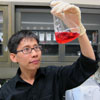 JOHNSON CITY - A researcher in East Tennessee State University's College of Public
Health has received an ETSU Research Development Committee (RDC) grant as he strives
to achieve what many of his peers consider improbable or even impossible: reproduce
in the laboratory human dietary fat particles that may contribute to a host of diseases.
JOHNSON CITY - A researcher in East Tennessee State University's College of Public
Health has received an ETSU Research Development Committee (RDC) grant as he strives
to achieve what many of his peers consider improbable or even impossible: reproduce
in the laboratory human dietary fat particles that may contribute to a host of diseases.
Dr. Andy Nauli, an assistant professor in the ETSU Department of Health Sciences, will advance his studies of fat absorption in the intestine through aid of the RDC grant.
Nauli said the scarcity of worldwide labs conducting similar research is one reason large fat particles have not been created artificially. Only four or five big labs are intensively studying fat absorption in the intestine, he said. Another reason is that the complexity of the small intestine - with its undulating, uneven surface affecting the creation and growth of fat particles - makes it difficult to recreate those conditions in artificial mediums. His peers also assert that feeding particles enough lipids to classify them as large fat particles kills them off before success can be declared.
Nauli admits the challenge is daunting. But he was successful enough in previous attempts as a postdoctoral research associate at The Scripps Research Institute in La Jolla, Calif., to be convinced his ETSU lab will yield a breakthrough. Nauli earned his doctorate in lipid physiology from the University of Cincinnati.
"A lot of the challenge in this study is convincing my peers that it can be done," Nauli said. "But my theory is that it can be. This research field basically gets stopped right there, with the inability to create large fat particles."
As for the hurdle of fattening up the particles without killing the cells, Nauli said his lab will use what is essentially a biochemical detergent to counteract what amounts to "fat poisoning."
Nauli said a better understanding of how our dietary fats are processed in the small intestine could lead to novel approaches to reduce the incidence of obesity, a major contributor to cardiovascular diseases and diabetes. He especially wants to determine if dietary fats could be burned as energy by muscle tissues instead of being stored as body fat by fat tissues. Particles created in the lab would make for purer research experiments that are free of variables in the body such as hormones and age.
"Creating large fat particles could play a big role in improving research in this field," Nauli said. "Even with the problems of obesity in our society, we don't really know for sure the role the intestine plays in its development."



